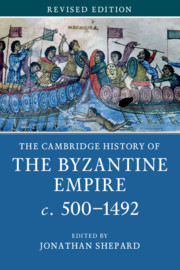Book contents
- The Cambridge History of the Byzantine Empire c. 500–1492
- Frontispiece
- The Cambridge History of the Byzantine Empire c. 500–1492
- Copyright page
- Contents
- Maps
- Illustrations
- Tables
- Dedication
- Preface
- Preface to the Paperback Edition
- General Introduction
- Part I The Earlier Empire c. 500–c. 700
- Part II The Middle Empire c. 700–1204
- Chapter 5 State of Emergency (700–850)
- Chapter 6 After Iconoclasm (850–886)
- Chapter 7 Religious Missions
- Chapter 8 Armenian Neighbours (600–1045)
- Chapter 9 Confronting Islam: Emperors Versus Caliphs (641–c.850)
- Chapter 10 Western Approaches (700–900)
- Chapter 11 Byzantine Italy (680–876)
- Chapter 12 The Middle Byzantine Economy (600–1204)
- Chapter 13 Equilibrium to Expansion (886–1025)
- Chapter 14 Western Approaches (900–1025)
- Chapter 15 Byzantium and Southern Italy (876–1000)
- Chapter 16 Belle Époque or crisis? (1025–1118)
- Chapter 17 The Empire of the Komnenoi (1118–1204)
- Chapter 18 Balkan Borderlands (1018–1204)
- Chapter 19 Raiders and Neighbours: The Turks (1040–1304)
- Part III The Byzantine Lands in the Later Middle Ages 1204–1492
- Glossary (Including Some Proper Names)
- Genealogical Tables and Lists of Rulers
- Alternative Place Names
- Bibliography
- Book part
- Picture Acknowledgements
- Index
Chapter 7 - Religious Missions
from Part II - The Middle Empire c. 700–1204
Published online by Cambridge University Press: 04 November 2019
- The Cambridge History of the Byzantine Empire c. 500–1492
- Frontispiece
- The Cambridge History of the Byzantine Empire c. 500–1492
- Copyright page
- Contents
- Maps
- Illustrations
- Tables
- Dedication
- Preface
- Preface to the Paperback Edition
- General Introduction
- Part I The Earlier Empire c. 500–c. 700
- Part II The Middle Empire c. 700–1204
- Chapter 5 State of Emergency (700–850)
- Chapter 6 After Iconoclasm (850–886)
- Chapter 7 Religious Missions
- Chapter 8 Armenian Neighbours (600–1045)
- Chapter 9 Confronting Islam: Emperors Versus Caliphs (641–c.850)
- Chapter 10 Western Approaches (700–900)
- Chapter 11 Byzantine Italy (680–876)
- Chapter 12 The Middle Byzantine Economy (600–1204)
- Chapter 13 Equilibrium to Expansion (886–1025)
- Chapter 14 Western Approaches (900–1025)
- Chapter 15 Byzantium and Southern Italy (876–1000)
- Chapter 16 Belle Époque or crisis? (1025–1118)
- Chapter 17 The Empire of the Komnenoi (1118–1204)
- Chapter 18 Balkan Borderlands (1018–1204)
- Chapter 19 Raiders and Neighbours: The Turks (1040–1304)
- Part III The Byzantine Lands in the Later Middle Ages 1204–1492
- Glossary (Including Some Proper Names)
- Genealogical Tables and Lists of Rulers
- Alternative Place Names
- Bibliography
- Book part
- Picture Acknowledgements
- Index
Summary
Although Christianity would seem by its very nature to be a missionary religion, both the sense of what ‘mission’ means and the specific motivations of missionaries have varied as each generation reads afresh the Gospels’ injunctions. Early Christians were keen to stress the ‘international’ character of their religion and the primordial equality of all peoples, yet a different conceptual system was embedded in the very language in which the early Christian apologists wrote. St Paul already uses the term barbarian, with its implicit contrast between ‘us’ and ‘them’. Early Christians also appropriated the discourse of the Roman world, which was similarly permeated with the spirit of empire. If the empire was ‘the world’, then those beyond the imperial borders were automatically assigned to an ‘other’ world, not inhabited by real people. Primitive Christianity opposed this kind of logic. St Christopher, for example, was – according to his Life – ‘from the race of dog-heads, from the land of cannibals’; but this did not prevent him becoming a Christian martyr. Does this imply that natural savagery could be eradicated? An answer can be found in another legend – the ‘Tale of St Christomeus’ – one of the apocryphal stories of the wanderings of the apostles Andrew and Bartholomew. The legend tells how a certain cannibal was visited by an angel, who breathed grace into him and ordered him to assist the apostles. When the inhabitants of ‘the city of the Parthians’ incited wild beasts against the preachers in the circus, Christomeus asked God to give him back his former nature: ‘and God heeded his prayer and returned his heart and mind to their former savagery’. This monster then tore the beasts to pieces, whereupon many of the pagans died of fright. Only after this did Andrew come up to Christomeus and say: ‘“the Holy Spirit commands that your natural savagery should leave you”… and in that moment his good nature returned’. The legend is clearly designed to glorify Christomeus and its superficial message is that even a cannibal can become a Christian. Yet the deeper message – which perhaps reveals itself despite the author’s best intentions – is precisely the opposite: that there is always a beast sleeping within any barbarian.
- Type
- Chapter
- Information
- The Cambridge History of the Byzantine Empire c.500–1492 , pp. 305 - 332Publisher: Cambridge University PressPrint publication year: 2019

